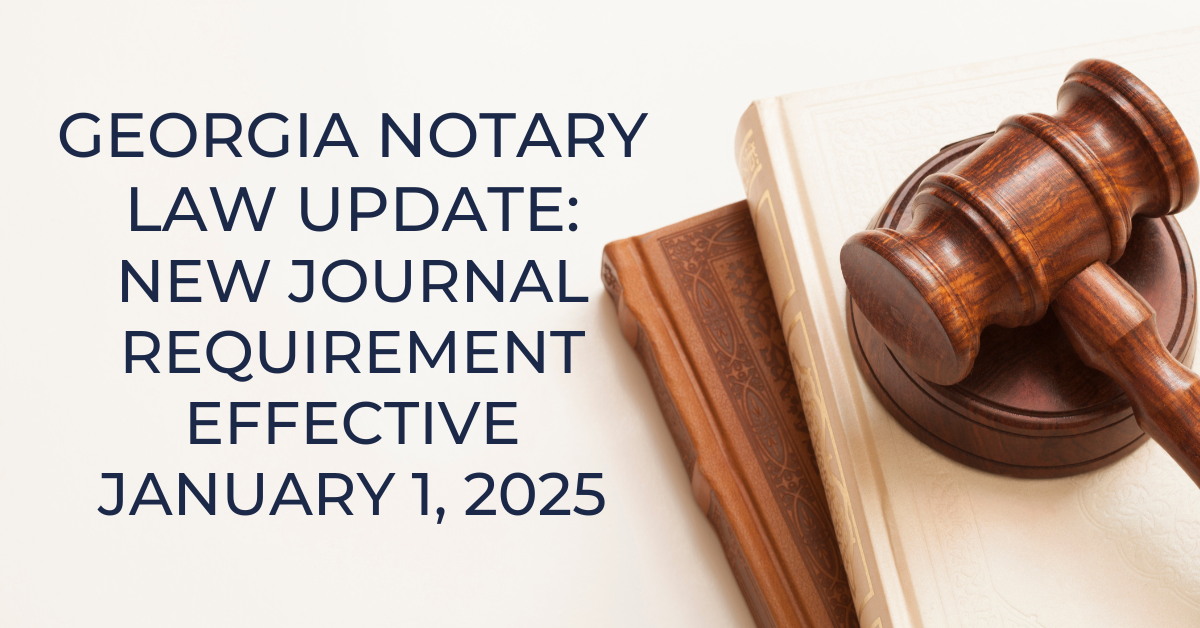Notary Public Underwriters Blog
Georgia Notary Law Update: New Journal Requirement Effective January 1, 2025
- Details
- Published: November 4, 2024

Are you aware of the upcoming changes to Georgia’s notary statutes? Beginning January 1, 2025, every Georgia notary public who performs a notarial act at the request of a "self-filer" must document the act in a written (paper) or electronic journal. This requirement was enacted by Georgia's General Assembly in late March 2024 and signed into law by the Governor on May 2, 2024. To review the full text of the bill, you can access it here.
What is a Self-Filer?
Under the new law, a "self-filer" refers to any person who is a party to certain instruments, such as deeds, mortgages, liens, maps or plats relating to real estate, and state tax executions and renewals. However, this does not include insurance agents, attorneys, licensed real estate brokers, agents of banks or federal credit union with federal deposit insurance or an affiliate, Georgia licensed mortgage lenders, servicers, public officials, or professional land surveyors in good standing performing their official duties.
Why You Should Get Your Notary Journal Now
Given that you will not always know when you will be presented with a notarization request from a self-filer, it is crucial to be prepared at all times by having a notary journal on hand. Here are some key reasons why maintaining a notary journal is beneficial:
- Compliance: Having a journal ensures you are prepared and compliant with the new regulations when they take effect.
- Reference for Future Questions: If disputes or questions arise about a particular notarization, your journal provides a record of the event, including who signed, when, and any important details.
- Liability Protection: Thorough record-keeping minimizes your exposure to liability by ensuring you follow vital steps during each notarization.
Industry experts have always strongly recommended that notaries maintain a journal. It serves as an essential tool in protecting yourself and your practice.
Take Action Today
With the January 1 deadline quickly approaching, now is the time to prepare. Establish good record-keeping habits by ordering your notary journal today. This small step will ensure you’re fully compliant with Georgia's new law and ready to handle self-filer transactions with confidence.
Don’t wait until the last minute! Stay ahead of the changes and be ready for the new requirements that will affect every Georgia notary.
Disclaimer: The information provided in this blog is for general informational purposes only, and should not be considered as legal advice. The contents of this post are based on the provisions of House Bill 1292 and knowledge as of the publication date. All content is subject to change without notice and is provided "as is," free of warranty of any kind. Readers are responsible for staying informed about notary laws, procedures, and practices.
Related Article(s)
Can I Notarize When the Person Has No ID?
What to Do When the Notary Certificate Is Missing?
What Should I Do When There's No Room for My Notary Stamp?
Can I Notarize a Document That Is Already Signed?
Can a Notary Change a Document’s Date?
How to Notarize Signatures on Handwritten Documents
What to Do When Names Don’t Match on the ID and Document
Is a Notarization Valid Without the Notary Stamp on the Document?
